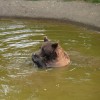Is it right to do experiments on animals
I gave up a career as a research scientist, because I personally was unable to continue using animals in my work. Later, I spent 14 years working for an organisation that promotes alternatives to the use of animals in research and testing.
The topic is deeply complex and both the "for" and "against" sides oversimplify the questions and use information selectively to present their case.
To be consistent, someone who totally opposes the use of animals in experiments would have to refuse treatment with any medicines or vaccines. They would also need to be vegan, wear nothing from leather and use no products that contain any ingredients derived from animals, since it would be inconsistent to oppose one form of animal exploitation yet condone others.Absolutely right !
Hey - We could take this thread over to the other one about sex offenders and the like - A ready source of experimental subjects much less cuddly than animals and it would be a better use for them - rather than moving them in next door to me without telling me
Exactly; I myself am against it. However, I really don't know nearly all the ins and outs, and reasonings behind it---regardless, though I am generally against it I'd love to hear the scientific studies, reasoning, and exceptions and just be educated on both sides for the reasons for and not further (by people in the field...not PETA, or those hell bent for it).
I try to keep an open mind before I go off about it.The organisations that work with scientists from academia and industry and with government regulatory authorities in order to reduce animal use follow the principles of the 3Rs. These aim to achieve a gradual improvement in the situation without compromising research. Unfortunately, it is a very slow process with many setbacks. For example, the number of animals used in the UK was dramatically reduced from the mid-1970s onward, but has started to increase again in recent years.
The 3Rs are:
Reduction of the number of animals used, e.g. by better experimental design, more sensitive tests
Refinement to minimise pain and suffering. This looks at the methods used and also at the ways animals are kept in the animal house.
Replacement of animal use where possible by the use of alternative methods.
In the US, CAAT (Center for Alternatives to Animal Testing) at Johns Hopkins, AWIC (Animal Welfare Information Center) at USDA and the Humane Society of the US are major players in this area.
In the UK, the government has set up the NC3Rs (National Centre for the Replacement, Refinement and Reduction of Animals in Research). FRAME (Fund for the Replacement of Animals in Medical Experiments, where I used to work) was the first organisation to promote the 3Rs in a big way. The RSPCA has a research department dealing with the 3Rs. The Hadwen Trust mainly concentrates on funding research to develop replacement methods.
Understanding Animal Research is a UK group formed by a merger between the Research Defence Society and the Coalition for Medical Progress. It presents the arguments for why animals should be used, although it supports the 3Rs as well.
All of these have web sites with good quality information.
There are similar organisations, both government-based and voluntary in other countries.
most of the drugs which are being used worldwide by millions of affected people were created after being tested on animals. to help humans combat diseses like hypertension,cancer,spinal cord injury, various types viruses, malaria, Parkinson’s disease etc.
if they have an alternative then this testing on animals is wrong but if there isnt? They are not just doing this for fun right? what has to be done has to be done to save mankind.
i understand that 90% of the animals used for these reserches are rats and mice. so its no big deal they are being used for such projects as we are killing them through various painful methods ourselves anyway.
The other 10% consist mainly of dogs,cats,rabbits and monkeys and i think its this 10% protesters are trying to protect from the testings. Im not an animal hater i love dogs by the way but testing on animals provides info on how new drugs would react inside a human body and detect info of health problems that might be caused by the drugs like blood pressure, liver & nerve damage, and damages to a unborn child. for that i think the testings being made are justifyable.Most scientists who are trying to reduce animal use are trying to reduce the use of all species. However, when the principle of refinement is used, a hierarchy is applied, so that replacing a higher species with a lower species is seen as a slight step forward.
Not everyone is concerned about rats and mice though. The US statistics on laboratory animals used do not include rats and mice at all.
You are correct that many people use poison to exterminate rats and mice in and around their homes. However, the rats and mice used in experiments are specially bred for that purpose, so it's not a case of just using animals that would otherwise be killed anyway.
One relatively new problem is that the transgenic rats and mice that are increasingly used in experiments are often produced so as to mimic various disease conditions. These animals may be suffering from the moment they are born.One relatively new problem is that the transgenic rats and mice that are increasingly used in experiments are often produced so as to mimic various disease conditions. These animals may be suffering from the moment they are born.
Gross!!! But if they are kept in the lab away from us they can do their test in whichever way they want as long if it benefits mankind
I just wanted to know what type of animals are chosen for medicines and what type of animals are chosen for cosmetics(other than humans).
I have no idea skyfire. got to wait for WriteAngled for that

From last year, the use of animals for cosmetics testing has been forbidden in the European Union, and from 2013 there will be a complete ban on sales of cosmetics with ingredients that were tested in animals after a certain cut-off date (don't know the date offhand).
Apparently the FDA does not require cosmetics to be tested, but some US companies still persist.
The types of tests needed for cosmetics are mainly to show that the product will not cause irritation to the eyes or skin and to see how much of it is absorbed through the skin. These are fairly simple phenomena and this is the area where most breakthroughs have been made with alternative methods.
Where animals are used, they tend to be (a) rabbits, used in the notorious Draize test, where the cosmetic is placed into their eyes, (b) guinea pigs for testing for skin reactions, where the skin is shaved off the back and the cosmetic applied, (c) mice and rats for general toxicity testing, carcinogenicity testing, reproductive toxicity testing (rabbits are also sometimes used). This last set (c) is not always needed specifically for a new cosmetic, because if the chemicals are otherwise used in any industry, they will have already been subject to toxicity testing.
However, I think with the EU ban on sales, there will be far less incentive for those companies who do still use animals to continue, because they will be cutting themselves off from a large market.
Incidentally, the big campaigns against cosmetic testing in the 1980s often used to target L'Oreal. Ironically, this company was one of first to invest heavily into the development of alternative methods!
The use of non-animal high-throughput screening methods to identify promising drug candidates has had a big impact on reducing the use of animals in medicines testing. These are computer model-based and biochemical/cell culture-based means of getting predictions about how a substance might behave.
Medicines testing also needs the basic toxicity tests as in (c) above. However, because medicines are used inside the body, more knowledge is needed about what happens there. Also, if I remember correctly, data is needed from a second species. Dogs are the most frequently used second species. However, depending on the type of medicine being tested, it may be considered necessary to use monkeys.
You also need to take into account basic biomedical research, which provides basic information about body processes and diseases which serves as a basis for the development of new drugs. Here, monkeys and cats are used for neurology research, pigs are sometimes used for cardiac research because their hearts are the most similar to human hearts. Ferrets, dogs, fish may also be used, as well as the transgenic rats and mice I mentioned earlier.
If you're interested in relative numbers and what species are used in what fields of research, the statistics on animal experimentation put out by the UK Home Office are the most detailed in the world. They are available from the HO web site at http://scienceandresearch.homeoffice.go … -research/
Sigh, I guess I should be writing hubs about this. However, after 14 years of work in this area, which led to total burnout, I'm not sure how much I want to...A wide variety of animals are used for cosmetic testing. The most common are rabbits and pigs. Rabbits are generally used to test perfumes, colognes, and dyes. They spray the fragrances into the eyes of rabbits and if the rabbit doesn't go blind, they figure the fragrance is safe for humans to use. They also dye patches of rabbit's fur and inject the dyes into rabbit's eyes. If the rabbit doesn't lose their fur or go blind from the dye, they figure the dyes are safe for humans to use. Pigs are used to test various cosmetics: eye shadows, concealers, lip glosses, mascara, etc. To test these cosmetics, pigs are made up much like a human would make up their face. No negative side effects means that they will put the cosmetic on the market for humans to use.
I am kind of on the fence about this issue. On one hand, I feel it is important for medicines to be tested and studied extensively. On the other hand, I feel that cosmetics are not a need. Cosmetics are a want, which is why I will not buy cosmetics or fragrances that have been tested on animals. Maybe it's a double standard, but need outweighs want for me.
I generally support animal testing of things like medicines, as long as efforts are made to treat the animals as humanely as possible in other respects, but I oppose testing cosmetics on animals. I think it's inexcusable to make other creatures suffer for human vanity.
This is a very complicated question. I don't want to see animals harmed and saying that testing on animals saves human lives is saying that one life is more valuable than another.

Yes, when it comes to experiments that will contribute to the health of humans.
The specific issue I am most indignant about is cosmetic use of Botox. Botox does have some important medical uses, which is a totally different issue. However, the problem is that each batch of Botox produced has to be tested to determine how strong it is. The test used is to inject mice with the Botox and see how many develop paralysis or die. LD50 = lethal dose 50, the dose needed to kill half the animals in the group. About 50% of all Botox produced is used to remove wrinkles from idiot men and women who are afraid of looking old. So 50% of all these animals are being sacrificed in a horrible, painful way for the sake of sheer vanity. This makes me very angry.
Hmmmmmmm, someone kills an animal so I can eat it, so I guess if they want to experiment on them in order to find methods of saving or prolonging human life, I can live with that.
can't buy that - killing for food is instant while experimenting is prolonged, but its a hard subject - is it right to put the life of one species above another - i can say no its not right, but then again if I were relying on the results of these experiments to save my child or my life well thats another thing ...as for cosmetic value - No.
What i want to know is what do they test poisons such as 1080 (used for baiting dingoes) on...the end result is a horrible painful death.
Animals are not ours to kill, eat, torture or use for entertainment! This includes experimenting. Why not experiment on murderers and rapists instead of innocent animals!?
- LegendaryHeroposted 15 years ago
0
As much as I don't like animal testing, I believe that it is MUCH better than the alternative.
I don't know......I don't believe we need to inject chemicals into an bunnies eyes to see how the new mascara is going to affect humans is a good way to go about testing. Brain testing....gray subject....look at those who are sexual predators....is that a good testing pool we could be looking at? I don't know....just throwing it out there...fire away...I don't really care today.
I am a lover of all animals, and definately do not agree with animal testing for the likes of comestics, after all we can live without makeup and it would probably be better for our skin if we did, but thats another story.
Animal testing for the development of medicine I feel is a must. Without testing on animals people would have no chance of survival against cancers and other terminal illnesses, and having lost family members to various cancers and still having friends and family fight the disease I know it is a must.
My only wish is that they could develope medicines using other methods. Lets hope that they will be able to soon.
Related Discussions
- 8
Do you think it is necessary to do animal testing?
by BlissfulWriter 13 years ago
Do you think it is necessary to do animal testing?Do you think it is necessary to do animal testing in order to produce drugs and products for humans and to do research on disease processes?
- 6
Should Animals Be Used In Research Aimed At Benefiting Humans And Not Animals?
by ngureco 13 years ago
Should Animals Be Used In Research Aimed At Benefiting Humans And Not Animals?Can The World Count On You As One Who Is Ready To Stand Up And Fight For Animal Rights As Well As Liberation Of Animals So That Animals’ Basic Interests Are Protected Just As The Basic Rights Of Humans?
- 10
How do you feel about animal testing?
by Morgan Peters 12 years ago
How do you feel about animal testing?
- 16
Are alternative medicines / New Age Medicines ethical?
by Mikeydoes 14 years ago
Geez I keep adding stuff and adding stuff, if you can read this God bless you.Well some people know, but many do not. I was nearly banned. Cancer was a part of my life(I have never had cancer, just to be clear) when I was young and it continues to be to this day with my great aunt.I was just about...
- 41
Wild Animals Captive: What Gives Us The Right?
by ShawnB2011 14 years ago
I was watching a show about when animals attack the other day n which it depicted wild animals attacking humans and us humans slay these animals for what they do naturally. In addition to that, I think zoos, carnivals and circuses should be banned altogether from being able to hold wild animals for...
- 9
Do You Support Animal Right Activist Who Seems To Care More About Animals Than T
by ngureco 13 years ago
Do You Support Animal Right Activist Who Seems To Care More About Animals Than They Do About Humans?



















